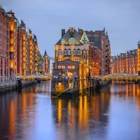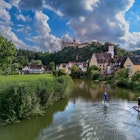
Munich’s food scene is embracing the diversity of its population with community-focused projects involving refugee chefs and restaurant staff from varied backgrounds. Locals and travellers alike can now visit a variety of eateries that aim to unite society as well as serve delicious dishes. Read on to discover inspiring projects to check out across the Bavarian capital, making your visit more worthwhile.

More than meets the eye
At first glance, Munich can seem flashy. A stroll along Maximilianstrasse, one of the city’s main shopping streets, is likely to be a flurry of fast cars, designer labels and fur coats. And while showing off some bling is definitely part of the Bavarian capital’s identity, you only have to dig a little deeper to find that Munich is also investing in its people.
The city is home to a number of initiatives working with diverse social groups, several of which are connected to gastronomic hubs, offering the chance to see a different side of the city while sampling some excellent cuisine. Sounds like a win-win situation to us!

Brunch with a side of community
In the centre of town you’ll find the much-talked-about Bellevue di Monaco cafe. Located in an unassuming green tower block close to the city’s central square, the building became the face of a local campaign to provide refugee housing in the heart of Munich. It was set to be demolished, but after growing pressure from the community, the City of Munich granted a 40-year lease and renovation began. In 2018, the building became home to a number of asylum seekers, with the stylish ground-floor cafe (run by refugees) becoming the focal point of the project.
Bellevue di Monaco offers weekly workshops, counselling services, information evenings and language classes, as well as film nights and music events. The cafe also has excellent food and great coffee. Highlights include the Turkish tomato soup with fig and nut couscous, the West African peanut and pineapple stew and the aubergine with toasted bread, almonds and yogurt.
On Saturdays, there is an extensive breakfast buffet from 10am to 1pm – with a mixture of sweet and savoury international dishes on offer. Be warned: this is pretty popular so don’t show up too late if you want to sample the full spread.

Eating outside the box
A similar initiative can be found across the river Isar, in the neighbourhood of Haidhausen. In the foyer of the local Volkshochschule (community college) is a small café run by both refugees and residents. It is managed by a non-profit known as Über den Tellerrand – a German expression meaning ‘beyond your plate’. Founded by a group of students in Berlin in 2013, the organisation has since evolved into nation-wide projects that work to integrate newcomers into German society – with the help of cooking workshops, language cafes and other food-related events.
The Munich cafe opened in July 2018 and prides itself on serving everything from Baklava to Breze (pretzels). A must try is the Syrian breakfast dish, Fatteh, packed with chickpeas, hummus and fried flatbread. There is a changing daily lunch menu inspired by cuisine from around the world as well as excellent sweet delicacies prepared by chef Radwan, who used to run a pastry shop in Syria. Guests are often invited to pay what they feel like giving – with all profits going to the charity.
The space is open and light, with a large outdoor terrace in summer. It is a relaxed place to sit with a book, feel like a student again and watch different groups gather to discuss their latest class over coffee.

A bite of Munich culture
Tucked away in a small side street off the aforementioned Maximilianstrasse, you’ll come across a blue building that is home to Conviva im Blauen Haus. This inconspicuous restaurant is also the canteen connected to one of Munich’s buzzing theatres, Münchner Kammerspiele.
Serving both international and regional dishes, the canteen is run by Cooperative Beschützende Arbeitsstätten e.V. (CBA) – an organisation that integrates people with mental health disabilities and physical limitations into working life. As well as providing jobs, CBA aims to boost social acceptance of their employees who work both in the kitchen and on the restaurant floor.
The lively eatery attracts a mixed crowd, from business types to pensioners, and is a good spot for lunch or a pre-show bite. The menu changes regularly but certain dishes, such as the Schnitzel (obviously!), are always available.

Deserving dining
If you’re in the market for an evening option, we suggest you head south – in the trendy district of Dreimühlenviertel you’ll find a venue with a similar concept to Jamie Oliver’s Fifteen, in London. Roecklplatz is a so-called training restaurant, offering an education in gastronomy to young people from challenging backgrounds. A total of ten training spots are available, with support also provided to help the trainees find permanent work afterwards.
The restaurant has an industrial flair with metal pipes lining the walls along with large shelving units laden with wine. In terms of food, there are steaks for meat-lovers and risottos, salads and pasta dishes for vegetarians. For those with a sweet tooth, make sure to leave space for dessert: the fluffy almond pancake with hot plum sauce and vanilla ice cream is every bit as delicious as it sounds.
Put your money where your mouth is
Making a stop at these different eateries is not only a great way to support a good cause; it also takes you to neighbourhoods off the beaten track. Checking out these projects provides an authentic opportunity to meet locals – with the people behind the initiatives always happy to tell you more about their work.
Most of these projects have a strong social media presence, not to mention websites with more information, and if you want to find out more about getting involved with local projects while travelling, why not check out Lonely Planet’s volunteering guide.
https://shop.lonelyplanet.com/products/munich-bavaria-black-forest-travel-guide-5
Explore related stories




 Festivals & Events8 of the best cities in Europe to celebrate New Year’s Eve
Festivals & Events8 of the best cities in Europe to celebrate New Year’s EveNov 6, 2024 • 7 min read







